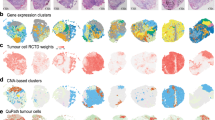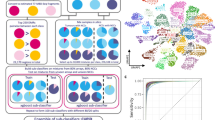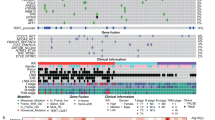Abstract
Background:
Given the potential importance of epithelial plasticity (EP) to cancer metastasis, we sought to investigate biomarkers related to EP in men with localized prostate cancer (PC) for the association with time to PSA recurrence and other clinical outcomes after surgery.
Methods:
Men with localized PC treated with radical prostatectomy at the Durham VA Medical Center and whose prostatectomy tissues were included in a tissue microarray (TMA) linked to long-term outcomes. We performed immunohistochemical studies using validated antibodies against E-cadherin and Ki-67 and mesenchymal biomarkers including N-cadherin, vimentin, SNAIL, ZEB1 and TWIST. Association studies were conducted for each biomarker with baseline clinical/pathologic characteristics an risk of PSA recurrence over time.
Results:
Two hundred and five men contributed TMA tissue and had long-term follow-up (median 11 years). Forty-three percent had PSA recurrence; three died of PC. The majority had high E-cadherin expression (86%); 14% had low/absent E-cadherin expression. N-cadherin was rarely expressed (<4%) and we were unable to identify an E-to-N-cadherin switch as independently prognostic. No associations with clinical risk group, PSA recurrence or Gleason sum were noted for SNAIL, ZEB1, vimentin or TWIST, despite heterogeneous expression between patients. We observed an association of higher Ki-67 expression with Gleason sum (P=0.043), National Comprehensive Cancer Network risk (P=0.013) and PSA recurrence (hazard ratio 1.07, P=0.016).
Conclusions:
The expression of EP biomarkers in this cohort of men with a low risk of PC-specific mortality was not associated with aggressive features or PSA relapse after surgery.
This is a preview of subscription content, access via your institution
Access options
Subscribe to this journal
Receive 4 print issues and online access
$259.00 per year
only $64.75 per issue
Buy this article
- Purchase on Springer Link
- Instant access to full article PDF
Prices may be subject to local taxes which are calculated during checkout



Similar content being viewed by others
References
Stephenson AJ, Kattan MW, Eastham JA, Bianco FJ Jr, Yossepowitch O, Vickers AJ et al. Prostate cancer-specific mortality after radical prostatectomy for patients treated in the prostate-specific antigen era. J Clin Oncol 2009; 27: 4300–4305.
D'Amico AV, Whittington R, Malkowicz SB, Schultz D, Schnall M, Tomaszewski JE et al. A multivariate analysis of clinical and pathological factors that predict for prostate specific antigen failure after radical prostatectomy for prostate cancer. J Urol 1995; 154: 131–138.
Irshad S, Bansal M, Castillo-Martin M, Zheng T, Aytes A, Wenske S et al. A molecular signature predictive of indolent prostate cancer. Sci Transl Med 2013; 5: 202ra122.
Bitting RL, Schaeffer D, Somarelli JA, Garcia-Blanco MA, Armstrong AJ . The role of epithelial plasticity in prostate cancer dissemination and treatment resistance. Cancer Metastasis Rev 2014; 33: 441–468.
Kalluri R, Weinberg RA . The basics of epithelial-mesenchymal transition. J Clin Invest 2009; 119: 1420–1428.
Domingo-Domenech J, Vidal SJ, Rodriguez-Bravo V, Castillo-Martin M, Quinn SA, Rodriguez-Barrueco R et al. Suppression of acquired docetaxel resistance in prostate cancer through depletion of notch- and hedgehog-dependent tumor-initiating cells. Cancer Cell 2012; 22: 373–388.
Gravdal K, Halvorsen OJ, Haukaas SA, Akslen LA . A switch from E-cadherin to N-cadherin expression indicates epithelial to mesenchymal transition and is of strong and independent importance for the progress of prostate cancer. Clin Cancer Res 2007; 13: 7003–7011.
Tanaka H, Kono E, Tran CP, Miyazaki H, Yamashiro J, Shimomura T et al. Monoclonal antibody targeting of N-cadherin inhibits prostate cancer growth, metastasis and castration resistance. Nat Med 2010; 16: 1414–1420.
Armstrong AJ, Marengo MS, Oltean S, Kemeny G, Bitting RL, Turnbull JD et al. Circulating tumor cells from patients with advanced prostate and breast cancer display both epithelial and mesenchymal markers. Mol Cancer Res 2011; 9: 997–1007.
Behnsawy HM, Miyake H, Harada K, Fujisawa M . Expression patterns of epithelial-mesenchymal transition markers in localized prostate cancer: significance in clinicopathological outcomes following radical prostatectomy. BJU Int 2013; 111: 30–37.
Qin J, Liu X, Laffin B, Chen X, Choy G, Jeter CR et al. The PSA(-/lo) prostate cancer cell population harbors self-renewing long-term tumor-propagating cells that resist castration. Cell Stem Cell 2012; 10: 556–569.
Heeboll S, Borre M, Ottosen PD, Dyrskjot L, Orntoft TF, Torring N . Snail1 is over-expressed in prostate cancer. APMIS 2009; 117: 196–204.
Ayala G, Tuxhorn JA, Wheeler TM, Frolov A, Scardino PT, Ohori M et al. Reactive stroma as a predictor of biochemical-free recurrence in prostate cancer. Clin Cancer Res 2003; 9: 4792–4801.
Khor LY, Bae K, Paulus R, Al-Saleem T, Hammond ME, Grignon DJ et al. MDM2 and Ki-67 predict for distant metastasis and mortality in men treated with radiotherapy and androgen deprivation for prostate cancer: RTOG 92-02. J Clin Oncol 2009; 27: 3177–3184.
Parker AS, Heckman MG, Wu KJ, Crook JE, Hilton TW, Pisansky TM et al. Evaluation of ki-67 staining levels as an independent biomarker of biochemical recurrence after salvage radiation therapy for prostate cancer. Int J Radiat Oncol Biol Phys 2009; 75: 1364–1370.
Pollack A, DeSilvio M, Khor LY, Li R, Al-Saleem TI, Hammond ME et al. Ki-67 staining is a strong predictor of distant metastasis and mortality for men with prostate cancer treated with radiotherapy plus androgen deprivation: Radiation Therapy Oncology Group Trial 92-02. J Clin Oncol 2004; 22: 2133–2140.
Verhoven B, Yan Y, Ritter M, Khor LY, Hammond E, Jones C et al. Ki-67 is an independent predictor of metastasis and cause-specific mortality for prostate cancer patients treated on Radiation Therapy Oncology Group (RTOG) 94-08. Int J Radiat Oncol Biol Phys 2013; 86: 317–323.
Berney DM, Gopalan A, Kudahetti S, Fisher G, Ambroisine L, Foster CS et al. Ki-67 and outcome in clinically localised prostate cancer: analysis of conservatively treated prostate cancer patients from the Trans-Atlantic Prostate Group study. Br J Cancer 2009; 100: 888–893.
Mak P, Leav I, Pursell B, Bae D, Yang X, Taglienti CA et al. ERbeta impedes prostate cancer EMT by destabilizing HIF-1alpha and inhibiting VEGF-mediated snail nuclear localization: implications for Gleason grading. Cancer Cell 2010; 17: 319–332.
Brabletz T, Jung A, Reu S, Porzner M, Hlubek F, Kunz-Schughart LA et al. Variable beta-catenin expression in colorectal cancers indicates tumor progression driven by the tumor environment. Proc Natl Acad Sci USA 2001; 98: 10356–10361.
Haffner MC, Mosbruger T, Esopi DM, Fedor H, Heaphy CM, Walker DA et al. Tracking the clonal origin of lethal prostate cancer. J Clin Invest 2013; 123: 4918–4922.
Haffner MC, De Marzo AM, Yegnasubramanian S, Epstein JI, Carter HB . Diagnostic challenges of clonal heterogeneity in prostate cancer. J Clin Oncol 2014; 33: e38–e40.
Bitting RL, Boominathan R, Rao C, Kemeny G, Foulk B, Garcia-Blanco MA et al. Development of a method to isolate circulating tumor cells using mesenchymal-based capture. Methods 2013; 64: 129–136.
Chen CL, Mahalingam D, Osmulski P, Jadhav RR, Wang CM, Leach RJ et al. Single-cell analysis of circulating tumor cells identifies cumulative expression patterns of EMT-related genes in metastatic prostate cancer. Prostate 2013; 73: 813–826.
Cottard F, Asmane I, Erdmann E, Bergerat JP, Kurtz JE, Ceraline J . Constitutively active androgen receptor variants upregulate expression of mesenchymal markers in prostate cancer cells. PLoS One 2013; 8: e63466.
Sun F, Chen HG, Li W, Yang X, Wang X, Jiang R et al. Androgen receptor splice variant AR3 promotes prostate cancer via modulating expression of autocrine/paracrine factors. J Biol Chem 2014; 289: 1529–1539.
Sun Y, Wang BE, Leong KG, Yue P, Li L, Jhunjhunwala S et al. Androgen deprivation causes epithelial-mesenchymal transition in the prostate: implications for androgen-deprivation therapy. Cancer Res 2012; 72: 527–536.
Acknowledgements
This work was supported by the Robert B Goergen Prostate Cancer Foundation Young Investigator Award, and the Department of Defense Physician Research Training Award (W81XWH-10-1-0483) (AJA) and NIH 1K24CA160653 (SJF).
Author information
Authors and Affiliations
Corresponding author
Ethics declarations
Competing interests
The authors declare no conflict of interest.
Additional information
Supplementary Information accompanies the paper on the Prostate Cancer and Prostatic Diseases website
Rights and permissions
About this article
Cite this article
Armstrong, A., Healy, P., Halabi, S. et al. Evaluation of an epithelial plasticity biomarker panel in men with localized prostate cancer. Prostate Cancer Prostatic Dis 19, 40–45 (2016). https://doi.org/10.1038/pcan.2015.46
Received:
Revised:
Accepted:
Published:
Issue Date:
DOI: https://doi.org/10.1038/pcan.2015.46



